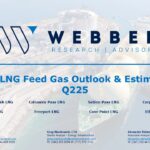Total Pages: 7
Table Of Contents
- Methanex & Renewable Methanol– Key Takeaways (page 2)
- Renewable Methanol (page 3)
- Methanol Feedstock & Applications (page 4)
- Hydrogen is Getting Cheaper (page 5)
- Renewable Methanol Facilities (page 6)
- Geismar Methanol Facilities (page 7)
- Methanex Overview (page 8)
- History – Geismar Units 1 & 2 (page 9)
- Geismar Unit 3 Comps (page 10)
- GU3 Cost Overview (page 11)
- Schedule – Key Milestones & Impact (page 12)
- Monthly Progress Curves (page 13)
- EPC Dynamics (page 14)
- Disclosures (page 16)
Key Takeaways:
1) Lower-Cost Hydrogen Will Produce Cost Competitive Renewable Methanol: Pipe Dream or Reality? Global methanol demand sits near ~75 MTPA; with demand expected to ramp amid new EU and U.S. environmental mandates. Renewable Methanol (RM) is produced using Hydrogen (H2) from solar/wind and carbon dioxide (CO2) as compared to traditional methanol produced from fossil fuels (i.e. coal & natural gas). (Page 4)
2) Cost-competitive RM would open the door to green plastics and support various marine, fuel, & vehicle clean energy mandates but, costs are not competitive based on current technology. (Pages 4 – 5)
3) Limited project economics hasn’t stopped ~10 commercial scale renewable methanol facilities in various stages of development around the world. As these projects develop, lower costs and improved technology would be a game changer for the methanol industry while providing H2 more downstream applications. (Page 6)
4) Tracking the 800 lbs. Methanol Gorilla…Methanex (MEOH). (Pages 8 – 9)
5) Geismar Unit 3: Positioning vs. Competition. (Pages 10 – 13)
6)The EPC Dynamics…So Long KBR, Next Up? (Page 15)
 client log-in
client log-in




